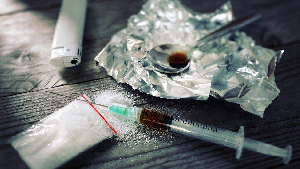 File photo to represent the story
File photo to represent the story
The Pharmaceutical Society of Ghana (PSGH) has taken keen interest in the recent media investigative reports, including the BBC Africa Eye documentary, which sought to expose the illegal importation and distribution of highly dangerous opioids into Ghana and other West African countries.
As the professional body representing pharmacists and pharmaceutical stakeholders in Ghana, PSGH unequivocally condemns the proliferation of unapproved and harmful pharmaceutical products, particularly those containing tapentadol and carisoprodol, which pose severe public health risks.
Regulatory Breaches and the Threat to Public Health
The documentary allegedly highlights how pharmaceutical companies, including Aveo Pharmaceuticals of India, have been exporting unlicensed and unregistered opioid formulations, such as Tafrodol, Timaking, and Super Royal-225, into Ghana.
These drugs, which are not approved for medical use anywhere in the world, have been linked to rising cases of addiction and severe health complications in the region.
PSGH notes with grave concern the implications of these illicit imports on public health and national security. The abuse of opioids has devastated communities, contributing to increased substance dependency, mental health disorders, and socio-economic challenges.
The Society is deeply troubled by reports that Ghana has become a key transit hub for these dangerous drugs, despite regulatory measures designed to prevent such occurrences.
Denial of Allegations Against Ghanaian Pharmaceutical Importers
PSGH has taken note of statements made regarding the alleged involvement of some Ghanaian pharmaceutical importers.
We also note that some of these companies have categorically denied any wrongdoing, asserting that all their imports comply with Ghana’s Food and Drugs Authority (FDA) regulations and legal requirements.
While the PSGH does not absolve any entity without due investigation, we emphasize the need for regulatory agencies to ensure transparency and due process in determining culpability.
We call on the FDA, the Pharmacy Council, Ghana Revenue Authority (GRA)-Customs Division, Criminal Investigation Department of the Ghana Police Service, Narcotics Control Authority, National Intelligence Bureau and all relevant authorities to expedite a thorough, independent investigation into these allegations.
If any local pharmaceutical company is found to have breached regulatory protocols, appropriate sanctions should be enforced to maintain the integrity of the pharmaceutical supply chain in Ghana.
Call to Action for Strengthened Regulatory Enforcement
To safeguard public health, PSGH strongly recommends the following immediate actions:
1. Enhanced Border Control: The Ghana Revenue Authority (GRA)- Customs Division, the Ghana Immigration Service and the FDA should strengthen surveillance at entry points to prevent the importation of unapproved drugs.
2. Strict Pharmacovigilance Measures: The FDA and Pharmacy Council should intensify monitoring of pharmaceutical imports and enforce stricter penalties for non-compliance.
3. Interagency Collaboration: Law enforcement agencies, health regulators, and professional bodies must work together to dismantle illicit pharmaceutical networks and protect the Ghanaian public.
4. Public Education and Awareness: Pharmacists, healthcare professionals, and civil society organizations must actively educate the public about the dangers of opioid abuse and promote responsible medication use.
5. Engagement with International Partners: The Government of Ghana should collaborate with Indian regulatory bodies and global health organizations to prevent the exportation of unlicensed drugs into West Africa.
Commitment to Upholding Pharmaceutical Standards
The PSGH remains committed to ensuring that only safe, effective, and approved medicines are available in Ghana. We urge all stakeholders, including the government, regulatory bodies, healthcare professionals, and the general public, to join hands in combatting the illicit opioid trade.
We will continue to advocate for stronger pharmaceutical governance and accountability to protect the health and well-being of all Ghanaians.
Thank you.
Pharm. Dr. Samuel Kow Donkoh,
PSGH President